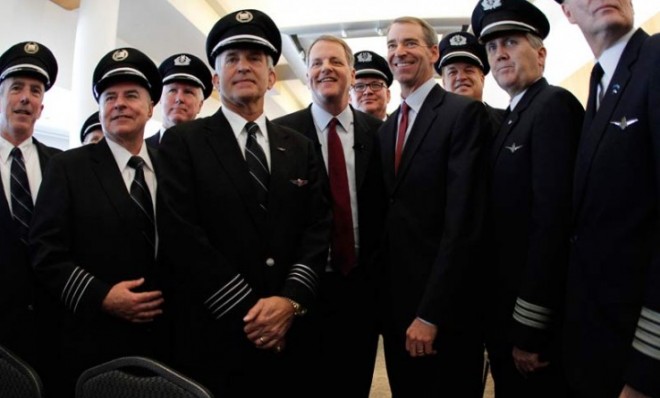Another big airline merger: What it means
The merger of American Airlines and US Airways will be the fourth between major U.S. airlines in five years

A free daily email with the biggest news stories of the day – and the best features from TheWeek.com
You are now subscribed
Your newsletter sign-up was successful
The looming merger of American Airlines and US Airways will have at least one clear consequence, said Justin Bachman at Businessweek: Travelers will soon be paying more for tickets. "Consolidation is a euphemism for fewer seats, and with fewer seats come higher prices." Ever since Congress deregulated the industry, in 1978, airlines have struggled to charge customers enough to cover their expenses. Inflation-adjusted fares have dropped 18 percent since 2000, while consumer prices in general rose by 33 percent. "That's what sticks in the craw of an airline executive," and this all-but-signed deal was driven by the enticing promise of finally charging customers more.
Still, "this is the right merger at the right time," said USA Today in an editorial. For the last three and a half decades, U.S. airlines "have been in a state of near chaos." American Airlines is fighting its way out of bankruptcy, and US Airways has already been through that process twice. "This is no way to run an industry, as exasperated fliers will attest." Strapped for cash and laden with debt, U.S. airlines have come to provide execrable customer service. This merger, the fourth between major U.S. airlines in five years, won't be a magic bullet, "but it can be the last leg in bringing the industry much-needed stability."
The mega-merger marks a "career achievement" for US Airways CEO Doug Parker, said Mary Schlangenstein at Bloomberg. He fired the starting gun for the current round of airline consolidation in 2005, when his America West merged with US Airways. Since then Parker has bid unsuccessfully for Delta and United, but he has clearly learned a thing or two from those failures. "He's done this the right way, and it's showing," said Gordon Bethune, the former CEO of Continental Airlines.
The Week
Escape your echo chamber. Get the facts behind the news, plus analysis from multiple perspectives.

Sign up for The Week's Free Newsletters
From our morning news briefing to a weekly Good News Newsletter, get the best of The Week delivered directly to your inbox.
From our morning news briefing to a weekly Good News Newsletter, get the best of The Week delivered directly to your inbox.
In fact, this deal is "more a takeover than a marriage," said Mitchell Schnurman in The Dallas Morning News. The new entity will be called American Airlines, after its much larger constituent part, but US Airways' Parker is slated to lead it. "The feisty little upstart, dissed and dismissed repeatedly by American management, made all the right moves and ended up on top." American CEO Tom Horton lost out by reacting defensively to Parker's bid. The real breakthrough came last year, when US Airways began courting American's disgruntled union leaders and winning over key stakeholders and Wall Street analysts. "Parker suddenly had real credibility, and the merger had a fan base." Now that he's proved himself as a dealmaker, he has to make what will be the biggest U.S. airline deliver on its promise.
A free daily email with the biggest news stories of the day – and the best features from TheWeek.com
Sergio Hernandez is business editor of The Week's print edition. He has previously worked for The Daily, ProPublica, the Village Voice, and Gawker.
-
 Political cartoons for February 21
Political cartoons for February 21Cartoons Saturday’s political cartoons include consequences, secrets, and more
-
 Crisis in Cuba: a ‘golden opportunity’ for Washington?
Crisis in Cuba: a ‘golden opportunity’ for Washington?Talking Point The Trump administration is applying the pressure, and with Latin America swinging to the right, Havana is becoming more ‘politically isolated’
-
 5 thoroughly redacted cartoons about Pam Bondi protecting predators
5 thoroughly redacted cartoons about Pam Bondi protecting predatorsCartoons Artists take on the real victim, types of protection, and more